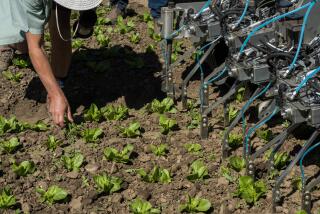Review: Nicholas Carr’s latest anti-technology rant, ‘The Glass Cage’
With his 2010 bestseller, “The Shallows: What the Internet Is Doing to Our Brains,” Nicholas Carr emerged as one of the Information Age’s chief scaredy-cats.
But why stop at terrifying people about the Internet? Carr’s new book, “The Glass Cage: Automation and Us,” expands the field of his paranoia to computers in general rather than just the kind we use for looking things up on Wikipedia.
Carr has two angles of attack: One is the familiar warning that robots are going to take all the jobs and leave us to starve; the other is that we are becoming so reliant on computers to automate even the most complex mental tasks that we are going to forget how to think.
There’s little point in rehashing the case against robots (Luddites, the smashing of machines, etc., are all brought in, as usual). Yes, machines are favored by the Man because they are always satisfied with their working conditions and never demand a raise. But back in 1954, union leader Walter Reuther decocted the true economic conundrum of automation, which, though it remains to be solved, is not quite what Carr thinks it is:
Reuther was being shown around the Ford Motor plant in Cleveland by a company official, who pointed out some of the automaker’s new “automatically controlled machines,” hard at work, and gloated: “How are you going to collect union dues from these guys?”
Without missing a beat, Reuther replied: “How are you going to get them to buy Fords?”
Carr’s second argument is even less persuasive. “If we’re not careful,” he writes, “the automation of mental labor, by changing the nature and focus of intellectual endeavor, may end up eroding one of the foundations of culture itself: our desire to understand the world.” There is no credible evidence given in the book to support this bizarre conclusion.
Inattentive doctors may rely excessively on computerized diagnostic tools to the detriment of patients. Sure! — but it does not seem to occur to Carr that the existence of inattentive doctors predates the invention of diagnostic software. The real question is whether a new automated system produces results superior to the old ones.
In the case of aviation, the answer is crystal clear, yet Carr somehow manages to draw the opposite conclusion from the one supported by facts. In a panicky chapter describing fatal plane crashes, Carr suggests that pilots have come to rely so much on computers that they are forgetting how to fly. However, he also notes the “sharp and steady decline in accidents and deaths over the decades. In the U.S. and other Western countries, fatal airline crashes have become exceedingly rare.” So yay, right? Somehow, no: Carr claims that “this sunny story carries a dark footnote,” because pilots with rusty flying skills who take over from autopilot “often make mistakes.” But if airline passengers are far safer now than they were 30 years ago — and it’s certain they are — what on Earth can be “dark” about that?
Carr is also prone to the omission of facts that weaken his point. Lamenting “the incursion of computers into elite professional work,” he mentions that “securities dealers and traders in NYC plummeted by a third, from 150,000 to 100,000, between 2000 and 2013, despite the fact that Wall Street firms were often posting record profits.” The biggest financial collapse since the Great Depression occurred in 2008; the reasons for the crash were complex, but it certainly resulted in the loss of hundreds of thousands of finance jobs worldwide. How this book went to print without noting this fact is anyone’s guess.
To be fair, a lot of finance jobs have really been lost in recent decades to automation. For example, zillions in brokerage commissions are no longer made on simple stock trades that are now executed for pennies online. But it seems a little unlikely that the foundations of culture will erode just because retail stockbrokers can’t fleece people anymore.
Carr rails against the reliance on GPS systems that causes us to become lost more easily, against drawing software that makes drawing by hand a relative chore, and in general against a blind and stupid worship of technology. Fair enough. But anyone who’s ever used autocorrect or suddenly been advised by a car to drive thousands of miles to Vermont — that is to say, nearly every working American, by this time — already knows that it is foolish to rely too heavily on technology and has already been acting on that knowledge for a long while.
Computers are tools, no different from hammers, blowtorches or bulldozers; history clearly suggests that we will get better at making and using them. With the gifts of intelligence, foresight and sensible leadership, we’ve managed to develop safer factories, more productive agricultural systems and more fuel-efficient cars. There’s a strong possibility that the human ingenuity that Carr is so quick to praise, so long as it doesn’t involve computers or automation, will eventually improve those as well.
Bustillos is a writer in Los Angeles.
The Glass Cage
Automation and Us
Nicholas Carr
W.W. Norton: 276 pp. $26.95
More to Read
Sign up for our Book Club newsletter
Get the latest news, events and more from the Los Angeles Times Book Club, and help us get L.A. reading and talking.
You may occasionally receive promotional content from the Los Angeles Times.







